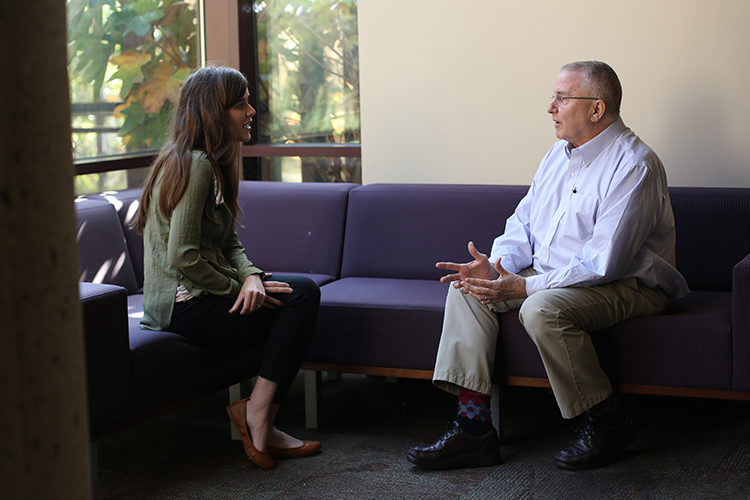
Earlier this month, Beeson Divinity School alumnus and hospital chaplain Drew Phillips (M.Div. '12) assisted a palliative care nurse practitioner at Ascension St. Vincent’s Hospital in Birmingham, Alabama, with an end-of-life care meeting with the family of a dying patient, providing spiritual support and care.
But this was no normal meeting.
Unlike the end-of-life care meetings that took place pre-coronavirus, this meeting was held over video conference and the patient was dying from COVID-19.
“Families of patients who are COVID-19 positive are dealing with complicated grief,” Phillips said. “They are not only grieving the loss of a loved one at the end of life, but also the loss of being able to care for the patient as they are accustomed to.”
While national attention is rightfully focused on doctors and nurses serving on the front lines of COVID-19 in hospitals, hospital chaplains also are serving alongside them, providing pastoral care to the health professionals and bridging the gap between patients and families.
At Princeton Baptist Medical Center in Birmingham, Alabama, Beeson alumna Cecelia Walker (M.Div. '98) serves as the executive director of chaplaincy and clinical pastoral education for Brookwood Baptist Health. She said that it is easy to forget that people are still getting sick and dying for other reasons besides COVID-19, but, because of the pandemic, families are still separated from their loved ones at the end of their life.
“We had a patient sick with something else and who was actively dying. The patient's parent wanted to hear their voice, and they wanted someone to take a phone into the patient's room to talk one more time,” said Walker, who was off duty that particular day. However, when she called to check on one of her chaplains, who told her of the situation, Walker was able to make the parent’s request happen.
Beeson alumna Suzanne Simmons (M.Div. '11), chaplain at UAB Hospital in Birmingham, Alabama, said that non-coronavirus hospital patients are lonely and grieving the loss of loved ones during their suffering.
“I spoke with a patient recently facing a new terminal diagnosis and who had no family present to sit with her as she accepted this reality,” Simmons said. “Chaplains have a sacred opportunity to bear witness to someone's suffering and grief at this time.”
Patients, who are awaiting transplants or recovering from surgery, are typically surrounded by loved ones, which brings peace to both patient and family. But now they are alone due to hospital regulations in light of COVID-19, she explained.
“It has reiterated to me how we are fashioned to be in community and communion with each other,” said Simmons. “We all need a person (or persons) along this journey, even more so in suffering. It highlights the beauty and assurance of the incarnation of Jesus himself.”
Not only has pastoral care been needed perhaps now more than ever for patients and families of patients in light of COVID-19, but also for those working on the front lines in the hospitals. Walker, who also serves as the director of clinical pastoral education (CPE) of the Brookwood Baptist Health System, has seen an increase of anxiety among health professionals and her fellow chaplains.
“We try to give people a place to share and vent their concerns,” she said. “I’ve also recorded prayers and written devotions every day for our staff.”
At Ascension St. Vincent’s, Phillips, along with fellow chaplains, has developed ways to get resources to hospital personnel through mediums such as videos, recorded messages, written prayers and reflections shared via social media.
“They have needed the same ministry from us as they always have: a listening ear and a calm safe presence,” he said. “As members of the team, chaplains offer a safe place to share concerns and frustrations. Just talking about the struggles seems to weaken their grip on the spirit and allows them to push on in the work of caring for critically ill patients. Sometimes hospital associates just need room to breathe and find a moment of rest before carrying on.”
As the pandemic continues, hospital chaplains will continue playing a critical role in the well-being and spiritual and emotional health of patients, families and medical personnel.
“As always, chaplains are called upon to be companions to others and journey alongside those who are suffering,” Phillips said. “This will be most important as we wade deeper into this pandemic in Birmingham. We will be available and present to hear and hold the spiritual and emotional burdens our health care workers need to unload. We will help bridge the gaps between patients and families who cannot be together at the most significant moments.”
Thanks to the generous support from some donors, the school is making chaplaincy ministry an even greater priority in the months and years ahead, said Beeson’s Dean Douglas A. Sweeney. For the first time, an Introduction to Chaplaincy Ministry course will be offered to students in fall 2020.
"We are so grateful for the ministries of many Beeson alumni who are serving on the front lines of hospital ministry in this perilous coronavirus season. They are spiritual first responders,” Sweeney said. “They may not play as great a role as the medical personnel in the healing of the bodies of their patients, but they play an essential role in caring for their souls and preparing some of them to meet the Lord."
